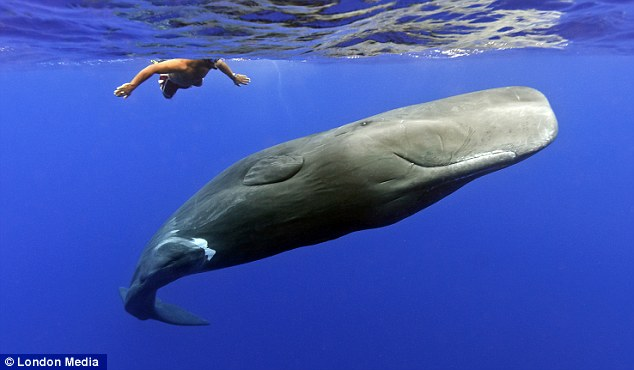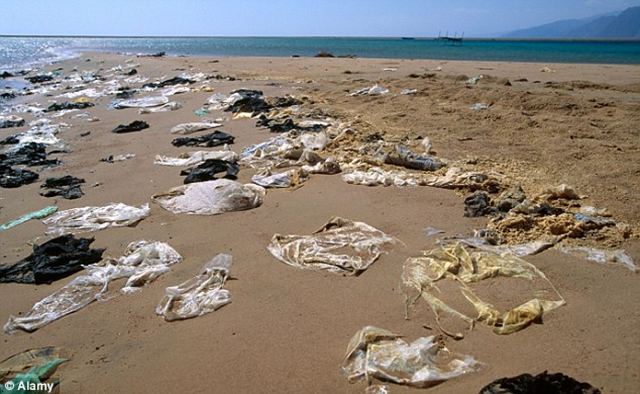Plastic bags are poisoning Earth’s greatest predators: Sperm whales are being killed by human pollution
By Philip Hoare
4 February 2012 It has the biggest brain of any animal — a massive 18lb to our human 3lb — yet we really have no idea what it does with it. This magnificent predator — at 65ft long, the greatest that has ever existed — spends 90 per cent of its life in the profound depths, able to dive deeper than any other animal. For precisely that reason, it is the least studied of all the great whales. And of all whales, it is under the greatest threat, too — from what we humans are doing to its environment. Only now are we beginning to understand these creatures. But is it too late? This week the results of the first Whale Symposium ever held in Britain were published in a book I co-edited. It contains new scientific research revealing the true nature of this most mysterious ocean giant, but also the devastating impact we humans are having on them — not least because we pollute their habitat with plastic bags and other waste — and the terrible problems they face as a result. The sperm whale is a natural submarine, a miracle of evolutionary engineering. It is actually able to change the physical shape of its body to accomplish its dives. […] Each sperm whale must consume up to 1,000 squid a day — that’s 1,100lb or half a ton of calamari! Although it has a 10ft-long jaw studded with 42 of the biggest teeth in the animal kingdom (each up to 2ft long), it does not bite its prey. Instead, it sucks up its food like a giant vacuum cleaner, swallowing the squid whole. We know this from the stomach contents of dissected whales. […]
By virtue of its position at the top of the marine food chain, the pollution we dump in the sea affects sperm whales more than any other creature. One of the greatest problems faced by any marine species is the sheer amount of plastic in the ocean, especially plastic bags, as has been highlighted by the Daily Mail’s campaign against the profligate use of them. Dr Ruth Leeney notes in the book I co-edited, Dominion: A Whale Symposium, these bags don’t biodegrade. They break down into smaller fragments that enter the food chain — and eventually the whales’ bodies.
‘It is ironic that a plastic shopping bag, with so short a lifespan in a person’s existence, can have a powerfully negative impact elsewhere, by causing unnecessary death’, says Dr Leeney. As my fellow editor, artist Angela Cockayne notes, a minke whale recently stranded itself on the French coast. Its stomach was clogged with 800kg of plastic, including British supermarket bags. […] On a recent trip to the U.S. University of Southern Maine in Portland, Dr John Wise showed me new research he has been conducting into the way contaminants from the chemical industry are entering the sperm whales’ bodies. He explained how chromium, a deadly carcinogen which induces lung cancer in humans, is released from chemical processing plants into the air. The whales, which pass by such plants on the coast of Queensland, northern Australia on their migratory routes, absorb the chromium because they breathe so deeply at the surface. The result is causing changes to immune systems, and fertility, creating birth defects analogous to Down’s syndrome in humans. In another recent and tragic case, a group of seven sperm whales stranded themselves on a Mediterranean beach. They had been driven into shallow waters, possibly by military sonar exercises. There they were unable to feed on squid. And since whales get their liquid from their food, they began to dehydrate. Then, their starving bodies began to break down fat — to deadly effect. The pollutants they’d absorbed from the ocean and had been deposited in their fat were released. They included heavy metals such as mercury, lead and cadmium, and organochlorines like PCBs and DDTs, even fire-retardants used on modern furnishings. In effect, the whales were poisoning themselves. Fatally weakened, they stranded themselves together on the shore, demonstrating the unswerving loyalty to each other for which their species is renowned. And when their carcasses were dissected, it came as no surprise to discover an unusual amount of plastic, including the dreaded plastic bags, in their stomachs. […]


I have a hard time reading/visiting this site because it is so heartbreaking.
We've self-authorized the 'use' of everything else for the benefit of a handful who don't care.
It' profoundly tragic, profoundly aggravating at the same time.
Maybe some day a better world will dawn with fewer rapacious humans and machines. Fewer plastic crap …